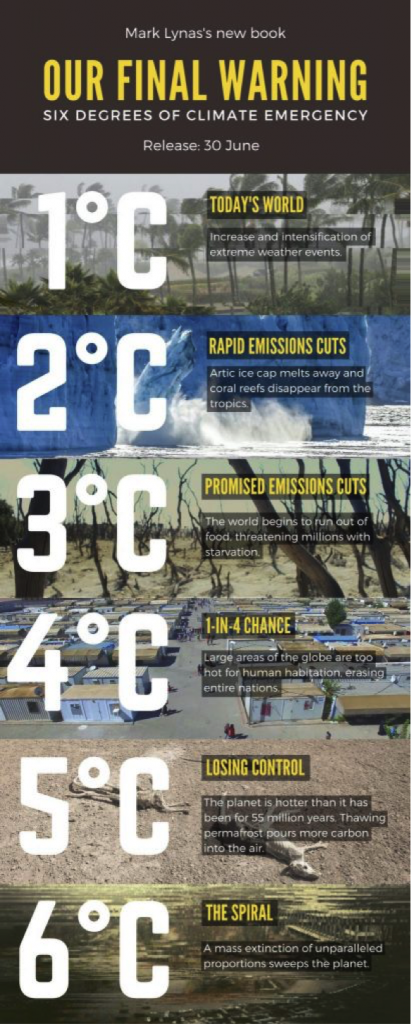A system change compass
In 2008 Mark Lynas, a science writer, published his book Six Degrees: Our Future on a Hotter Planet. He is back now with his final warning; Six Degrees of Climate Emergency. In the twelve years since the first book was published, the situation has not improved. His apocalyptic scene in 2045 where hurricane Odessa destroys houses and floods large parts of Houston Texas has actually happened in 2017, when hurricane Harvey reached Texas in a world already 1 degree warmer than in preindustrial times.
His book lays out the scenarios for an increase of 1,2, 3 and more degrees Celsius. We are in chapter one: between 1 and 2 degrees. He has become, understandably, more pessimistic. Australian philosopher Toby Ord explains in his book The Precipice how climate change and environmental damage have become an existential risk to humanity. The Runaway Greenhouse effect is driven by the relationship between heat and humidity. Warmer air can hold more water vapour than cool air. So with a warmer atmosphere, the balance shifts between how much of the earth’s water is in the oceans and how much is in the atmosphere. Water vapour is a potent greenhouse gas, hence amplifying a negative feedback loop. If the oceans boil off, it leaves a planet incompatible with complex life.
Lynas believes an apocalypse is still avoidable, but it will require transformative action and rich countries would have to fund the energy transition of the low-income countries. We still have options.
It is encouraging that political leadership seems to up their game. An increasing number of countries announce net zero targets. And the USA will return to the climate table too.
We also know, however, that some countries that really matter because of their impact do not keep their pledges. Companies in hard-to-abate sectors are also announcing carbon neutral targets, mostly by 2050 and with varying scope. Focusing on carbon neutrality has become strategic. Enough strategy drivers point in this direction: cost of capital, license to operate, operational risks, investor and consumer preferences, stranded assets and the ability to attract talent. They will have to aggressively implement strategies to achieve carbon neutrality and steer innovation and investment towards this target.
The EU’s Green Deal was recently underpinned by a so-called System Change Compass: a social economic agenda for modernisation co-authored by the Club of Rome and Systemiq. This could be a moment where the talk is followed by walk. Coherent actions that include political, social, economic and technological dimensions. It is not merely left or right politics, but recognition that we face risks threatening our future potential and that we have a responsibility to act. The cost of inaction and idle words is simply too big.
I was thrilled to see that the Green Deal got this systemic underpinning and encourages everyone to read the report or watch this recording. It is hard to understate the importance of an integrated approach supported by climate and transition science, not distracted by short-term objectives of interest groups and climate deniers.
This is a much better end-of-year reading than the soap opera in which political movement gets airtime or the end-game-noise of a politician hanging on to power. While you read you can listen to some really good music too.
Fred van Beuningen

Source: marklynas.org
